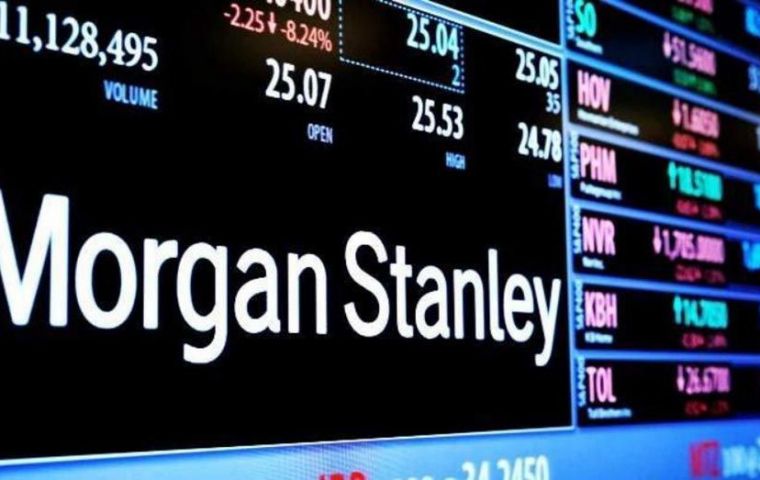MercoPress. South Atlantic News Agency
Argentina downgraded to “independent market” in MSCI ratings
 Capital controls drove Argentina to where it ranks now
Capital controls drove Argentina to where it ranks now MSCI, formerly Morgan Stanley Capital International, a US company that measures stock performances worldwide to advise potential investors on their decisions, has removed Argentina from their various listings and added it to the dishonourable category of “stand-alone” economies.
In other words, the country became not worth considering at all, which translates to harsher conditions to have access to international financing.
Prior to Thursday's review, Argentina was among the Emerging countries, alongside Brazil, Chile, China, Colombia, Czech Republic, Egypt, Greece, Hungary, India, Indonesia, Korea, Malaysia, Mexico, Pakistan, Peru, Philippines, Poland, Qatar, Russia, Saudi Arabia, South Africa, Taiwan, Thailand, Turkey, and the United Arab Emirates.
Had it been demoted only one notch, it would have joined the ranks of markets more volatile than the emerging ones, known as Frontier, but which can still be very profitable since they have lots of room for growth despite the risk of their bonds becoming hard to sell if the economy deteriorates. These countries can more easily be manipulated by hedge funds and are vulnerable to global shifts in trade, currency, and central bank policy changes. The group was created in 2007 and it includes Bahrain, Bangladesh, Croatia, Estonia, Jordan, Kazakhstan, Kenya, Kuwait, Lebanon, Lithuania, Mauritius, Morocco, Nigeria, Oman, Romania, Serbia, Slovenia, Sri Lanka, Tunisia, Vietnam as well as the West African Economic and Monetary Union (Benin, Burkina Faso, Ivory Coast, Guinea-Bissau, Mali, Niger, Senegal, and Togo).
Below Frontier countries are standalone ones: Jamaica, Panama, Trinidad and Tobago, Botswana, Zimbabwe, Lebanon, Palestine, Bosnia, Bulgaria, Malta, Ukraine... and now Argentina.
The main reason behind MSCI's new rate is reportedly the validity of the exchange rate. The truth is that foreign currency, whenever possible, is handled at the unofficial rate of US $ 1 = AR $ 170 instead of the US $ 1 = AR $ 100 at which exporters are paid for their sales abroad, which in addition to taxes continues to raise doubts about whether there is any profit at all.
Argentina's previous promotion to “Emerging,” entailed a clear warning about not putting capital controls to keep that category, analysts have explained. But “since September 2019, international institutional investors have been subject to the imposition of capital controls in the Argentine stock market,” explained Craig Feldman, Global Head of Indices Management Research and a member of the MSCI Index Policy Committee.
Within the MSCI Emerging Index, there were only three Argentine companies listed abroad: YPF, Globant and Adecoagro, which are expected to be the ones most affected by the new rate.
Argentina's downgrade was not a surprise, but its fall below Frontier was, according to local analysts.
“The prolonged severity of capital controls without resolution is not in line with the accessibility criteria of the MSCI Emerging Markets index. This has led to the reclassification of Argentina from emerging markets to independent markets status,” Feldman added in the statement.
The reason why the decision is even harsher than expected lies in the expectation that if Argentina moved to the Frontier category, it could benefit even more than when rated as Emerging, from investors willing to take more risks.
Of the eight Argentine companies that had joined the MSCI Emerging Markets index in 2019, only Globant and YPF remain today, while Adecoagro recently replaced Telecom Argentina. However, it's weighting barely reached 0.098% in the case of Globant, 0.012% for Adecoagro and 0.011% in the case of YPF.
“MSCI's decision significantly harms local stocks, affecting the entry of certain flows. Basically, they take the country out of emerging markets but they do not position it as a border either, remaining isolated until a new reclassification is analyzed,” financial advisor Lucas Yatche explained.




Top Comments
Disclaimer & comment rulesCommenting for this story is now closed.
If you have a Facebook account, become a fan and comment on our Facebook Page!